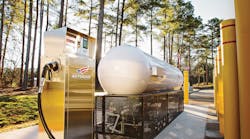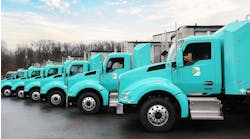No two vehicle fleets are exactly alike, so it should come as no surprise that there isn’t a one-size-fits-all solution for refueling. Whether a fleet has 10 vehicles or 100, propane autogas has a refueling solution that will meet the needs of all fleets. Fleet managers can choose from four propane autogas refueling options which allow fleets to create a tailored program that specifically fits their needs. Affordable and scalable refueling is one of the many reasons propane autogas vehicles boast the lowest total cost-of-ownership of any fuel.
Here are five scenarios in which the scalability of propane autogas refueling infrastructure can meet the needs of any fleet.
Larger fleets of 50 vehicles or more:
For large fleets that require a centralized refueling location, an advanced private station is the best solution. With this setup, fuel storage tanks with sufficient capacity to meet fuel needs and 2 or more fuel dispensers are installed. Overhead canopies may be added for protection from the weather during refueling. Like all permanent propane autogas refueling solutions, the station can easily expand with the growth of a fleet, adding more dispensers and fuel storage tanks as demand increases.
In some instances, fleets may have a choice of owning or leasing the refueling infrastructure. If the leasing option is available, fleets will be responsible for site preparation, electrical supply and the installation of crash protection. Propane marketers and infrastructure providers will work with you to determine the best solution for your fleet.
Small fleets of 50 vehicles or fewer:
Smaller fleets with a centralized refueling location can lower costs by choosing a standard private station. This refueling solution involves the installation of a 1,000- to 3,000-gallon tank plus one or more dispensers. Like an advanced private station, fleets may be able to lease or own the infrastructure. If the leasing option is available, fleets are responsible for site preparation, electrical supply and the installation of crash protection.
Commercial fleets with limited on-site space:
A number of fleets are taking advantage of the benefits of propane autogas without installing permanent infrastructure by choosing our mobile refueling option. If this convenient solution is allowed in your area, your fleet will work with a local propane retailer to customize a refueling plan for the vehicles on-site, one-by-one, from a propane bobtail truck. Costs and situations vary with this option so check with your propane retailer for details and pricing.
Fleets in the process of building permanent refueling infrastructure:
Some fleets may be in the process of installing permanent infrastructure and need to deploy vehicles prior to completion of the installation. Propane autogas has a solution for this fleet also. Some propane marketers can provide a temporary refueling solution complete with a fuel storage tank and dispenser mounted on a trailer that can be delivered to work sites. This scenario works for both short term or extended use. Replenishing the fuel storage tank is scheduled with the propane retailer, but like mobile refueling, costs and situations will vary. This is a viable solution for fleets that require refueling while working for long periods on sites located away from the centralized refueling location, such as construction vehicle fleets during a large project.
Fleets that service a wide area:
Another option that requires no infrastructure investment is provided by existing networks of propane autogas refueling stations. There are public and private refueling networks that provide fuel for fleets of all sizes. If a network is not available for your locations, a propane retailer may establish one for a large fleet that consumes enough fuel to justify the costs of installing the refueling site. Alternately, several fleets can combine to provide the fuel demand required to justify the installation of a larger refueling network.
Refueling networks provide 24/7 security and convenience and use a card lock system that tracks fuel use and costs per vehicle, while providing convenience along routes. A complete list of public refueling stations is available from the U.S. Alternative Fuels Data Center at afdc.energy.gov/locator/stations.
Regardless of the refueling setup a fleet chooses, transitioning to propane autogas vehicles will save fleets money with lower fuel costs, a lower vehicle total cost-of-ownership, and not to mention insulation from fuel price fluctuations at the pump. We encourage fleet owners and managers to visit propane.com/on-road-fleets for more information on propane autogas vehicles and refueling options.



